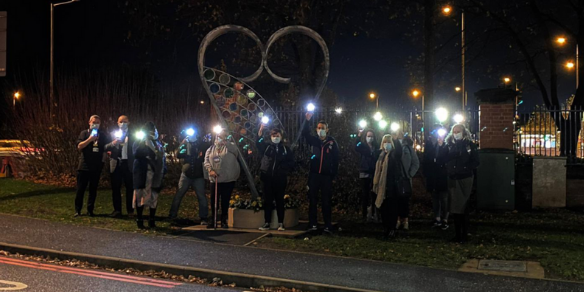UHDB colleagues light up the sky to recognise World AIDS Day

The main entrance at Royal Derby Hospital was lit up by the glow of people’s phones yesterday evening – as a show of Team UHDB’s ongoing support for people living with HIV and AIDS worldwide.
Colleagues from across the Trust gathered in the dark outside of the hospital to mark World AIDS Day by shining their phone torches into the night sky as part of a special light vigil.
Rates of HIV are thankfully starting to fall in the UK and that’s thanks to the incredible work of teams nationwide like UHDB’s HIV service, which offer regular treatment and support through clinics run at Florence Nightingale Community Hospital.
Made up of HIV consultants, clinical nurse specialists and psychiatrists, the team provide a walk-in outpatient service for patients from across Derbyshire, and offer both face-to-face and virtual appointments, while also seeing patients in their own homes too.
More than 500 people make use of this valuable service each year, with patients being seen regularly by specialists who can put them on the daily medications needed to effectively manage the condition and also give them access to mental health support, as part of their treatment plan.
Catherine Gatford, Clinical Nurse Specialist for HIV at UHDB, said: “I think that the vigil is a great idea and it’s lovely that we can still all come together to support those living with HIV during the pandemic. The rates of HIV are thankfully starting to drop in the UK now, and that’s down to getting people tested, diagnosed and onto treatment quickly, so that the virus is no longer detectable. You can’t pass on HIV if the virus is undetectable for more than six months, which is an amazing thing for our patients.
“It’s really important that people know that there are lots of different treatments available now to allow people with HIV and their partners to live normal lives. We want people to know that, whilst it is difficult to deal with a diagnosis that there is still stigma around, if you come to clinic and continue treatment – which is often just a tablet a day – this can keep you well for your normal life span. Whilst you can get treatment for HIV though, it’s so important that people make sure that they look after themselves beforehand and test reguarly.”
“I am really proud to work here and to be able to help those patients who need us,” Catherine added. “We see a lot of patients who we work closely with and you remember how poorly they were when they started, but we’ve managed to help them get through what they’ve had to cope with. It is amazing when you see that patient, who you thought might die because they were so poorly, go on to get married and be trying for a baby – it is really rewarding.”
Dan Walton-Ashmore, Chair of the LGBTQIA+ Network, said: "We still have a long way to go in educating our communities on HIV now being a long term condition.
"Knowing your status and having regular checks is the only way we can reach the UK targets of 0 transmission by 2030. HIV positive people who are on treatment can lead healthy normal lives and once established on effective treatment may no longer transmit the virus. Undectetable means untransmittable.
"LGBTQ+ people have been instrumental in the fight for equality."
